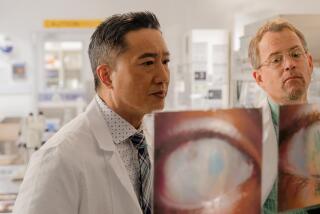Book Review : A Survivor’s Account of Brain Surgery
- Share via
A Bomb in the Brain: A Heroic Tale of Science, Surgery and Survival by Steve Fishman (Scribners: $19.95; 318 pages)
Illness is a universal human experience, with a vast literature of fiction and nonfiction from doctors and patients alike. “A Bomb in the Brain” by Steve Fishman is a stunning contribution to the genre, which should take its place alongside the best of them.
It is the first-person story of a young man’s brain hemorrhage and all that follows--diagnosis, successful surgery and, ultimately, epilepsy--told with searing and heart-rending honesty and insight. It is full of texture and layers and conveys a great deal of information to boot. No book in a long time has had such an emotional impact on me.
The story begins in Nicaragua, where Fishman, a 28-year-old journalist from New York, suddenly suffers a searing headache and loss of vision while standing in a hotel lobby. For two weeks no one correctly diagnoses the life-threatening nature of the problem. Not till he gets back to New York and has a CT scan does Fishman discover that a blood vessel broke in his brain and that many people die on the spot when that happens.
From Groin to Brain
After that, he undergoes an angiogram, in which a tube is threaded through his body from his groin to his brain so doctors can determine what caused the hemorrhage.
It turns out to be an arteriovenous malformation, a patch of malformed blood vessels in the brain, which could explode again at any time. Surgery is recommended to remove the malformation and prevent a recurrence. Fishman agrees.
At each stage of the diagnosis and treatment, Fishman stops and steps back, explaining the diagnostic and surgical procedures, including anesthesia. He provides fascinating histories of these medical miracles and the pioneering doctors who brought them about.
Until fairly recently, brain surgery was considered a hopeless enterprise. One-third of all patients died of the treatment, and many others suffered debilitating effects. Few were cured.
Not Quite a Piece of Cake
Yet medicine persevered, burying many patients along the way (most of whom would have died of their ailment if they hadn’t been killed on the operating table). Now, if brain surgery is not quite a piece of cake, it is regularly performed with a high degree of safety and success.
After his own surgery, Fishman persuaded his doctors to let him observe other similar operations, which he writes about with exceptional clarity and control.
All of this sounds pretty straight-forward and not much to get excited about if you’re not interested in the history of medicine and the latest surgical techniques.
But there is much more to this book. Seamlessly interwoven through the story are a welter of feelings, not only of the patient, but of his family, his girlfriend, his doctors, his nurses--even the social worker who visits him the night before his surgery. Fishman skillfully shifts his point of view among all of the actors.
While giving the details, he never loses sight of the whole. Shortly after checking into the hospital, he writes: “Sickness isn’t only estrangement and pain. At its core is an invitation to respite. I experience this aspect of my condition as the most seductive pleasure. I had trudged around with that pain in my head for how long? It might have been my whole life. Then a doctor said, ‘You’re sick,’ and it was for me, as if the whole imploring world, pacing at my door, had been told to cool its heels. I feel unburdened.”
Opened His Head to Save a Life
He adores his doctors, idolizes them, a not-uncommon experience. They have opened his head and saved his life.
And then, a year after the surgery, he begins to have epileptic seizures. Whether they are caused by damage done by the original hemorrhage or by the surgeon’s scalpel no one knows. But he will have them forever. He has traded the possibility of another brain hemorrhage and sudden death for the certainty that several times a year his brain will misfire and he will have a seizure.
His four-year love affair collapses under the strain. Life is irreparably different.
Fishman’s attitude toward the doctors and surgeons who treated him so skillfully changes. “Medicine could not return me to a presick state, nor could I,” he writes. “The surgeons learned to accept failure by putting it behind them; I had to learn to live with it.”
A Long Way From Nicaragua
“I have come a long way from the hotel lobby in Nicarague where nearly a half cup of blood jetted into my brain and almost killed me. I have been introduced to medicine’s most sophisticated diagnostic machines, benefited from its finest therapeutic skills. I had signed on as a booster of high-powered medicine, the medicine that saved my life. In the end I got epilepsy, a weird ailment with an incomplete treatment, and needed other help. Having been marked cured, I was left to cope, which changed how I viewed the cure.”
He doesn’t blame the doctors. They did their best, which was very good indeed. But they did not--could not--do much for his anguish.
Fishman was lucky to survive the hemorrhage. We are lucky he was so lucky.
More to Read
Sign up for our Book Club newsletter
Get the latest news, events and more from the Los Angeles Times Book Club, and help us get L.A. reading and talking.
You may occasionally receive promotional content from the Los Angeles Times.







